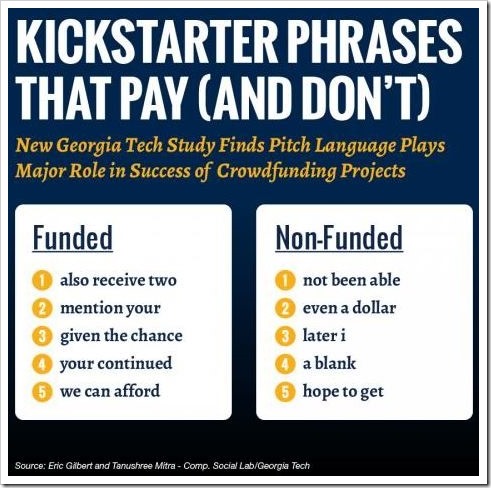Kickstarter is world’s largest crowdfunding platform, where entrepreneurs and artists can seek funds for their projects. Since its launch in 2009, more than 5 million people have crowd sourced more than 50,000 projects such as movies, music, stage shows, comics, journalism, video games, and food-related projects.
The modus operandi is pretty clear: You register at Kickstarter and pitch your project to these millions of investors who want to support the next big idea. In return, the investors get tangible rewards like the product itself (music album, movie ticket, video game etc) or a special experience related with the product or the creator (example a special dinner with the movie director, a special tour of the art studio etc. )
Not all creative projects which are pitched at Kickstarter investors get the desired attention. Almost 50% to 60% of the projects fail to meet the minimum donations and hence fail. As of now, Pebble is the most successful Kickstarter campaign as it has generated close to $10 million funding. But, there are big time failures as well like Ninja Baseball video game, which was much publicized and promoted but was able to receive only one-third of its initial goal of $10,000!
Why so much discrepancies exist in crowd funding? Which projects make the threshold donations and how do they make it?
Researchers at Georgia Tech were so much intrigued by these questions that they decided to do research into the crowd sourcing phenomenon which has taken the creative and entrepreneurial world by storm. By their research, they have revealed, for the first time in history, the predictive power of successful campaigns and the reasons project fail.
Assistant Professor Eric Gilbert and doctoral candidate Tanushree Mitra studied more than, 45,000 projects which have been pitched at Kickstarter, and researched the phrases and words which have been used in the pitches of these projects.
Professor Gilbert shared, “Our research revealed that the phrases used in successful Kickstarter campaigns exhibited general persuasion principles. For example, those campaigns that follow the concept of reciprocity – that is, offer a gift in return for a pledge – and the perceptions of social participation and authority, generated the greatest amount of funding.”

A summary of their findings are:
– Showcasing the scarcity element is a benefit. The successful projects used these phrases in their pitch: “option is” and “given the chance.”
– Social Proof is one of the most important ingredients of success. By using phrases such as “has pledged” suggests that the creator required social backup and support and it hits the chord.
– Social Identity or the feeling that one belongs to a particular community helps in creating a positive impact. Phrases such as “to build this” and “accessible to the” reflects this factor
– Displaying authority on the subject matter also creates a sense of reliability and the crowd loves it. Using phrases such as “we can afford” and “project will be” demonstrates this trait.
On the other hand, the unsuccessful projects used these terms more often in their pitches:
- “Not being able to”
- “even a dollar”
- “Later”
- “a blank”
- “hope to get”
The full research paper “The Language that Gets People to Give: Phrases that Predict Success on Kickstarter” would be formally presented at the 17th ACM Conference on Computer Supported Cooperative Work and Social Computing (CSCW 2014) to be held in Baltimore, USA from Feb. 15 to 19.
